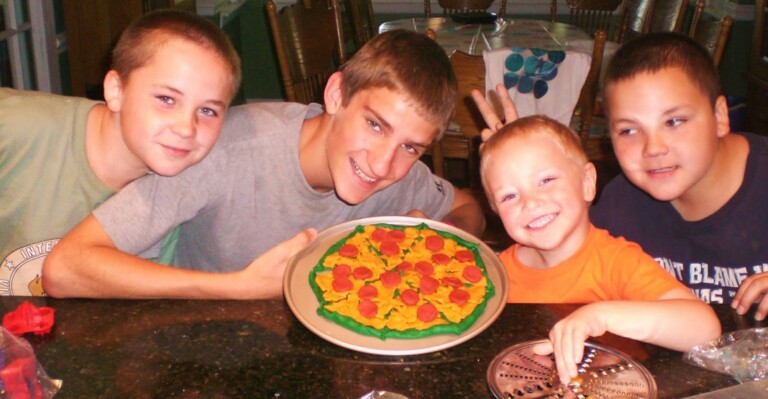How to Not Be Your Child’s Best Friend
 Can you be your child’s best friend?
Can you be your child’s best friend?
Someone suggested I could have given specific steps in the post Why You Can’t be Your Child’s Best Friend. It goes to show that, when I think people should get the point, they might not get it because their situation and way of thinking is different from mine. Circumstances and kids are different. I still say that if you’re the parent, you can’t be your child’s best friend. You can be their friend, and when they are grown you can be one of their best friends. You can be their confidant when they are small, but you cannot be their best friend when you are the parent.
This person asked why I didn’t give specific steps or instructions or an outline of what the process looks like. The process looks like someone who is in charge and their offspring know they are in charge. You cannot be your child’s best friend and be the parent just like you can’t mix oil and water. It does not work. But, I’m game to try to explain this better.
So here goes.
 The parent instead of the best friend
The parent instead of the best friend
- When you are the parent, you make the rules and the consequences. When a child does not follow the rules, you follow through on the pre-planned consequences. And, in the event of outright defiance and disrespect, you stay the course. You don’t cave, you don’t give in to whining, and you do not bargain with the child. This means you don’t tell them, “Well, if you will do this for me, then I will let you . . .” If you have told the child No, the answer is No all day today, all day tomorrow, and for the duration of the time necessary. You do not count to three. Do not pass Go; you do not collect $200. Period. Who makes the rules at your house? Do you say NO? Do you know how to follow through and maintain that NO? If you can do that, then you are well on your way to not being your child’s best friend.
- When you are the parent, you do not pinch-hit for your kid. This means you not do for them what they can do themselves. You do not go to bat with a teacher when he can bat for himself. On his forgotten assignment, let him talk to the teacher about how to rectify the grade. Do NOT talk to the teacher for him because he is capable himself. Do not bail him out. Let him learn the consequences of his behavior. When your child is capable of taking care of his things, his room, his toys, then he needs to do it. Let him learn responsibility when he is young, and he will be on the way to being a responsible adult. This means that if he leaves a treasured toy outside when he knows he is to bring it inside, you don’t bring it in. If it becomes damaged, you do not buy another one to replace it for him. Do you let your kid work out his own solutions or do you do it for him? Are you truthful with others instead of fudging for your kid? Do you pick up after your child because you want him to like you instead of making him do it on his own? Your answers tell whether or not you are trying to be your child’s best friend. If you can stay strong and hold him responsible for his actions, then you are on your way to not being your child’s best friend.
- When you are the parent, you follow through. You don’t “forget” because it’s easier than dealing with the situation. You do not pretend you did not see because that’s easier, too. Deal with the situation and follow through. The sooner you do this, the easier it will be for everyone. Your child will learn at an earlier age to obey because he will figure out that disobedience is not worth the consequences. Do you find yourself ignoring, forgetting, or just not following through on consequences when your child has been wrong? Do you take the effort to follow through even when it’s hard? What do your answers say about your type of parenting?
- When you are the parent, you remember to be true to yourself. And no, everybody else’s parent is not letting their kid do it. Too often parents do not want to be different from other parents; they want their child to enjoy what other kids enjoy. They don’t want their child to have to be different, so they base their decisions on not being different instead of doing what is best for the child. You are not raising everybody else’s child; you are raising yours. That responsibility is heavy and you must be true to yourself. That means you decide based on what is best for your child and not based on what the kid wants or what everybody else’s kid gets to do. Does it bother you when your child assures you that everybody else’s parent lets their kid do this? Do you flounder wanting to be like other parents so your child will like you? If you are a parent who flounders, then you certainly fit into the “I am my child’s best friend” category. When you refuse to flounder, you are well on the way to not being your child’s best friend. If you remain true to yourself and do what is best (long term) for your child, then good for you for not being your child’s best friend.
The end of the day
At the end of the day, your child needs to know that the wall is solid. This makes him feel secure. He needs to know that he can trust you to be truthful. It will give him security, not only today, but for the rest of his life. At the end of the day, it does not matter how other parents parent. It does not matter if they try to be their child’s best friend. Your child needs your love; he gets that when you refuse to cave, when you ignore whining and continue to do what is best for him. That shows true love. Your goal is to help your child become a responsible, mature adult. You are responsible for how you raise your child, not others. You can only do this by not being your child’s best friend.







Yes, yes, yes:). I loved this post! We set a plan for our daughter every year, based on her age and where she was at in general. Then, we stuck to it. We were clear and she understood. Consequences were right up front on the first offense, which honestly only happened a couple of times over her entire upbringing. She knows we are always in her corner, asks us for some council, but really is capable at 23 to know what is best. She comes home to us from college and it is wonderful.
Thank you so much for sharing. It’s great to hear from a parent who is on the other side and did it this way – and to hear the results of a child so raised. Kudos to you! It’s so much work to stay the course, but as you have shown us, it is well worth it.